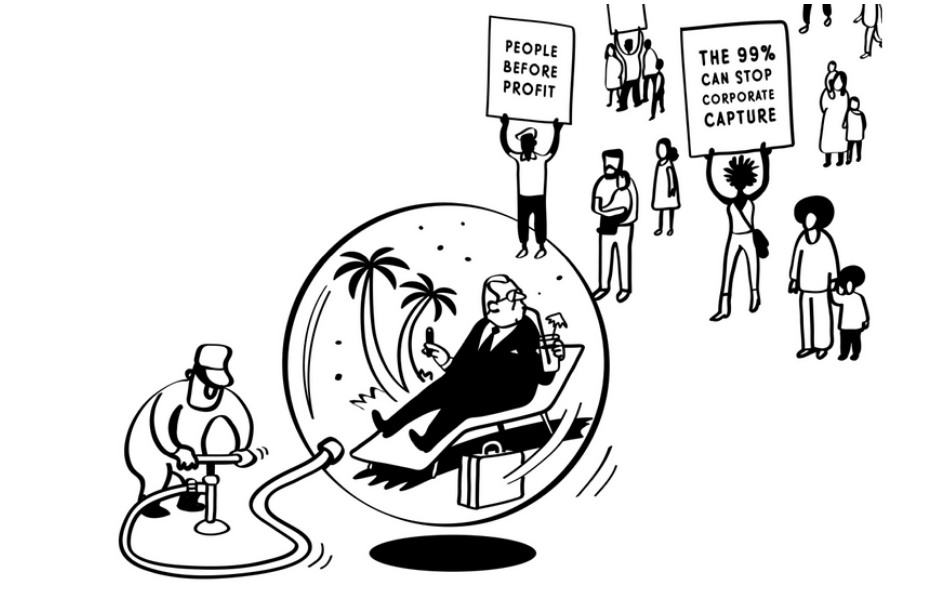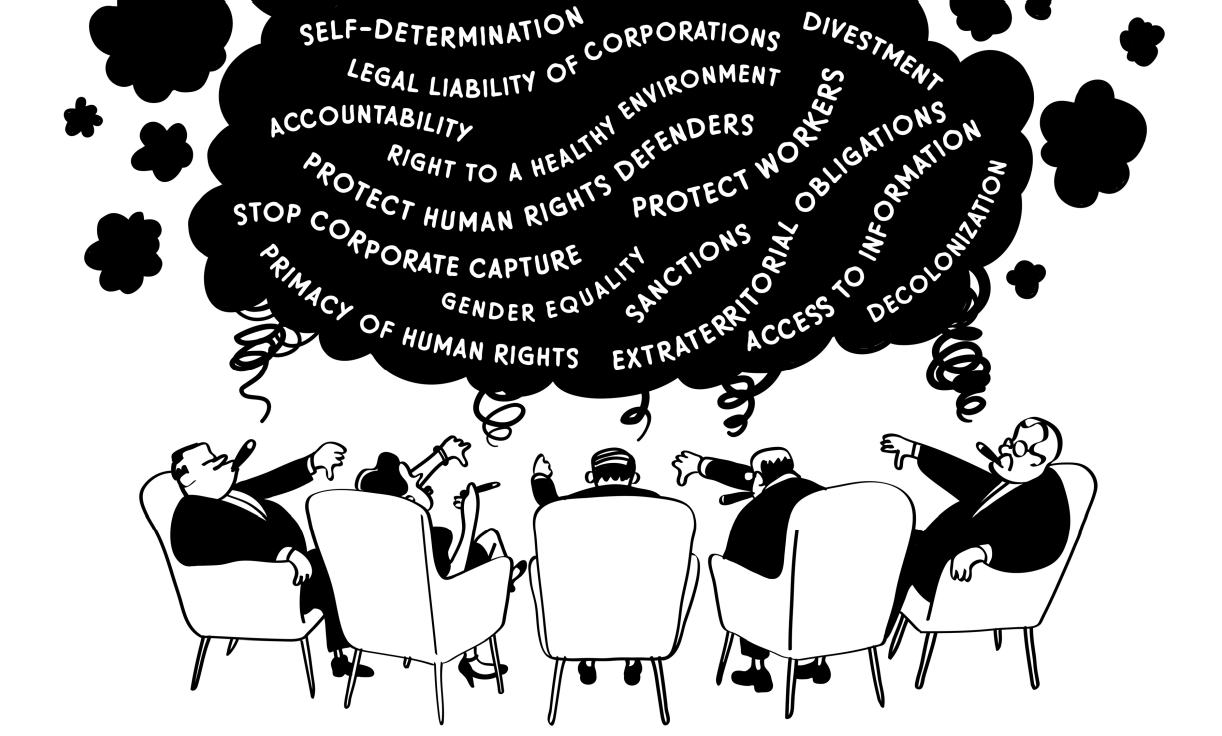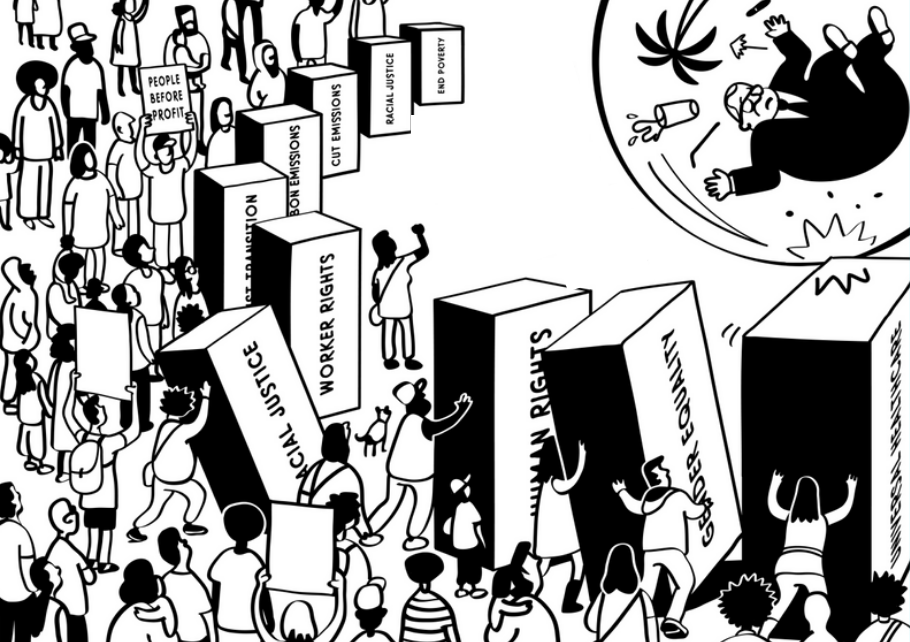
Statement: States must act urgently to adopt a legally binding instrument to regulate corporate power
States must act urgently to adopt a legally binding instrument to regulate corporate power
Human rights and the environment cannot wait any longer
Ahead of the seventh session of the Open-Ended Intergovernmental Working Group to elaborate a legally Binding Instrument on Transnational Corporations and other Business Enterprises with respect to human rights (IGWG), civil society organizations and social movements call upon States to act urgently for human rights and move boldly towards a swift adoption of a legally binding instrument (LBI) that can help stop human rights violations in the context of business activities and protect the people and our planet by stopping corporate impunity. After seven years on this process, we ask the question - if not now, when? Now is the time to act. Human rights and the environment cannot wait any longer and we cannot allow corporate capture of our government decision making processes to continue delaying the realization of our demands.
CORPORATE CAPTURE IS A BARRIER TO ACCOUNTABILITY
According to the World Health Organization, more than 4.5 million people have died so far from COVID-19. The pandemic has caused great loss of lives, widespread suffering and increased poverty, damaging people’s livelihoods. On the one side of this unprecedented intertwined economic, financial, care, health, food, and humanitarian crisis are those people bearing the historic and structural inequalities resulting from years of colonization, discriminatory macroeconomic policies, rise of conservative undemocratic forces and the advance of corporate impunity. On the other side are corporate elites who have grown their influence on government through “corporate capture”, who have received subsidies and tax benefits throughout the pandemic, weakened legislation that could hold them accountable, passed laws that maximize their profits, forced employees to work even in context of lockdowns or unsafe conditions, employed children to minimise labour costs, kept extractive activities open despite high rates of infection among workers, and won millions at the expense of workers’ rights and women working in care.
We are outraged, for example, that 400 million jobs have been lost due to the pandemic, and more than 430 million small enterprises are at risk, according to the International Labour Organisation (ILO). Yet, as an Oxfam Report affirms, the “25 richest billionaires have increased their wealth by staggering amounts. Jeff Bezos could personally pay each of Amazon’s 876,000 employees a one-time $105,000 bonus today and still be as wealthy as he was at the beginning of the pandemic''. Alongside the growing wealth of corporate elites, we have also seen growing corporate capture of policy-making spaces such as at the UN Food Systems Summit.
VOLUNTARY MEASURES ARE NOT ENOUGH
In this context, the adoption of an international treaty on human rights and business would be a landmark achievement to support impoverished, marginalized, exploited and other at-risk communities in claiming justice and reparation from corporate elites. States’ support of an LBI to regulate corporate power would not only meet the historic demands of global social movements and affected communities, but also crown the efforts/fight for justice and reparation of many generations of over decades and make a crucial step towards the unpostponable task of advancing human dignity and climate justice. To move in this direction, States must have an honest conversation and recognise that current voluntary frameworks and measures on human rights and business, that have played an important role in positioning human rights in the business agenda, are insufficient to enhance remedy and reparation and to close the accountability gap of business activities, particularly those of a transnational character.
While we acknowledge that new national regulation focusing on human rights due diligence is advancing in Europe, we are also conscious of its limitations and challenges, and we strongly believe that an LBI is needed to set the standard for corporate accountability across the globe. An LBI will not only set global standards for the practicing of corporate due diligence but it will also set parameters to enable holding State and non-State actors accountable for human rights abuses and violations related to business activities through strong standards of criminal, civil and administrative liability for corporations. In the face of the urgent need for a global legal framework to protect people and planet from corporate greed and State connivance, it is worrying that an important group of States among the most industrialized Western States are still delaying action, maneuvering to avoid negotiations or even plotting to derail the process by launching alternative initiatives and models of treaty, such as a basic framework convention, that would only delay or weaken progress made and tie us to failed models and frameworks.
VACCINE APARTHEID & UN PARTICIPATION
In the context of the upcoming treaty negotiations, we are concerned that severely unequal access to COVID-19 vaccines generates a virtual vaccine apartheid adding difficulties for the participation of social movements and affected communities in this process and urge States to work harder and prioritize resources for the online and remote participation of all without discrimination, particularly those in the Global South. This requires time allocation and language diversity that would accommodate groups not able to be present in Geneva and the sharing of comprehensive notes by the UN Secretariat at the end of each day in all languages of the UN.
ON THE SUBSTANCE OF THE THIRD DRAFT LBI
In terms of substance, a first reading of the third draft LBI to regulate business activity reveals important progress and an opportunity to advance on corporate accountability - particularly if States, in support of their communities, commit to strengthening protection of human rights in the text and participate in good faith to guarantee access to justice for those affected by business activities. While we are deeply concerned that several of our key demands have not yet been incorporated into the text, we also saw no major changes compared to the previous draft. We welcome the fact that the text maintains a stronger gender approach. We also welcome that there are new references to concerns of civil society regarding labour rights or climate justice, among others. Yet we regret that most of the technical and political proposals made by social movements, representatives of affected communities and even states during past six-year sessions were not included or have become diluted.
Among key gaps that must be addressed in the upcoming IGWG session and subsequent draft LBI are:
-
The lack of a provision on the right to self-determination is deeply problematic and must be clearly stated in the text of the LBI.
-
While we note a reference to corporate obligations in the preamble of the new text and among the purposes of the LBI, we believe this should be further strengthened with an operative paragraph dedicated to recognize the obligations of business corporate entities, particularly those of a transnational character.
-
We remain concerned that the text does not address the exacerbated threats of corporate abuse and violations in situations of conflict and the need to strengthen the text in this regard, particularly in relation to sanctions, divestment and criminal liability through universal jurisdiction and beyond.
-
The recognition of financial institutions and banks as pillars of the international corporate architecture is key yet this needs to be further enhanced with provisions that guarantee the primacy of international human rights law over trade and other legal agreements.
-
In the context of a new wave of bilateral and multilateral trade and investment agreements we urge the adoption of improved provisions that effectively address the problem of corporate capture.
-
Provisions to protect human rights defenders in the treaty must be strengthened.
-
In spite of the advances in terms of provisions for rights of victims and protection of victims, remedies and prevention ( e.g especially regarding mandatory human rights due diligence) the draft still falls short of properly addressing accountability and remedy and it remains insufficiently clear in terms of corporate liability along the global value chain.
WE CANNOT WAIT ANOTHER TEN YEARS!
In conclusion, we want to reiterate the urgent need for an LBI to regulate corporate activity. After seven years of advocacy, it is about time that States, especially those from the Western industrialized region, listen to the calls of affected communities, civil society and social movements and act to end corporate impunity by setting binding standards that will protect against it.
If not now, when? We cannot wait another ten years!
Read the statement in Chinese.




